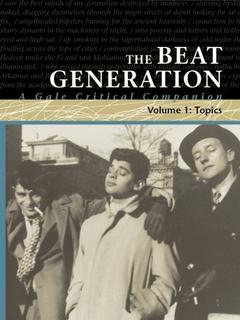
The following report comes from Heidi Benson, of the San Francisco Chronicle:
"Fueled by various stimulants, fellowship and a near-mystical belief that the world must change and poetry was the way to do it, this group coalesced and staged a reading on Oct. 7, 1955 -- at the Six Gallery on Fillmore Street -- that has gone down in history as the moment of conception of the Beat movement.
No photographs of the evening have turned up, but by all accounts, when 150 to 200 people showed up at this low-ceilinged former auto-body shop in response to hastily printed postcards, the size of the crowd astonished everybody.
Rexroth served as master of ceremonies that Friday night. Kerouac, who had declined to read, brought jugs of burgundy to share.
First to take the orange-crate podium was San Francisco-born Surrealist poet Philip Lamantia, who read poems by John Hoffman, a friend who had just died.
Next up was McClure, reading "Point Lobos: Animism" and "For the Death of 100 Whales," both presaging the animal-rights movement.
Then came Philip Whalen, a friend of Snyder's from Reed College and later a Zen monk, reading his poem "Plus Ca Change."
(On this night, McClure first met Whalen and Snyder.)
Then Ginsberg took the stage, drunk, some say, and visibly nervous. Kerouac urged him on, hollering "Go! Go! Go!" as the poem gained momentum:
"I saw the best minds of my generation destroyed by madness, starving hysterical naked,
dragging themselves through the negro streets at dawn looking for an angry fix,
angelheaded hipsters burning for the ancient heavenly connection to the starry dynamo in the machinery of night ..."
The poem brought down the house. Ginsberg and Rexroth were in tears."
The T.S. Review celebrates this important poetry event, which in some ways inspired the goals of the Fusion Poetry movement 40 years later (in 1995). What is to be regretted is that, despite widespread media attention for such historical (and thus relatively safe) movements, the fact that a true current subterranean movement of global poets, driven by the Internet, is primarily neglected, in favour of established figures who represent a fairly mainstream alternative.
If only some more of the Beat spirit of risk, derangement and humour could continue to subvert and impel the poetry now being published and celebrated in the U.K. and elsewhere. Meanwhile, it must never be forgotten that Beat poetry mistakenly relinquished its hold on form, craft and the sense of tradition - all necessary aspects of the poetic art.
Hence the need for Fusion, which is an attempt to merge The Beat and the New Critic (both sides of the poetic psyche) approach and thus establish a fertile rapprochement that can enable poetry to find its force in both chaos and craft: full-bore passion and a blessed rage for order wrestling together to create inseparable dance-beauty.
Comments